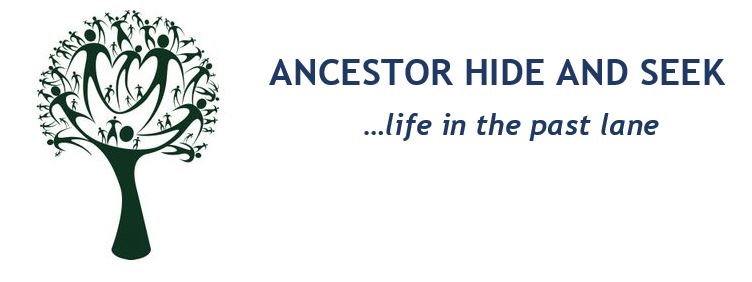Welcome to my first post! You made it, and more importantly, so did I. This blog has been a over a year in the making, which in hind-sight seems a bit silly, but I got mired down trying to find the perfect name. Read more about my blog naming tribulations here.
It really shouldn't have mattered so much what I called it, and perfection is clearly over-rated, but that's what happened. Then I proceeded to get sidetracked down 6852 rabbit holes (before I lost count), and here we are.
So let's get you caught up. I spend a LOT of time playing hide & seek with my ancestors, and sometimes other peoples' ancestors too. Some have been quite easy to find, while other ancestors are particularly good at the game and are still in hiding. But I'm also pretty good at the game, and persistent too (did I hear someone say obsessed? shush!) With a combination of digging through records, solid detective work, collaboration, circumstantial evidence and/or plain dumb luck, one by one I've been flushing them out of their hiding spots.
I also use genetic genealogy to find ancestors and make connections with living DNA cousins, sometimes as far back as 6th cousins. It was very gratifying to identify the birth parents to help a cousin who'd been adopted .
My current main focus (as if I only have one!) is researching and writing about the immigration odyssey of a group of Scottish settlers who came to Ontario via Venezuela (as one does). Stay tuned for more!
So let's get you caught up. I spend a LOT of time playing hide & seek with my ancestors, and sometimes other peoples' ancestors too. Some have been quite easy to find, while other ancestors are particularly good at the game and are still in hiding. But I'm also pretty good at the game, and persistent too (did I hear someone say obsessed? shush!) With a combination of digging through records, solid detective work, collaboration, circumstantial evidence and/or plain dumb luck, one by one I've been flushing them out of their hiding spots.
I also use genetic genealogy to find ancestors and make connections with living DNA cousins, sometimes as far back as 6th cousins. It was very gratifying to identify the birth parents to help a cousin who'd been adopted .
My current main focus (as if I only have one!) is researching and writing about the immigration odyssey of a group of Scottish settlers who came to Ontario via Venezuela (as one does). Stay tuned for more!

Comments
Post a Comment